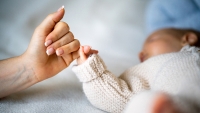Early Non-Invasive Markers of Infant Development

We will follow the development of babies from 3-4 months of age through 15 months of age. We will assess development of the brain, autonomic nervous system, perception, and attention. We will also assess social and language/communication development. We will use these data to examine if non-invasive, objective markers can identify developmental and learning delays.
Projects Leads
Dima Amso, PhD
- Professor of Psychology at Columbia University
- Early Non-Invasive Markers of Infant Development - Lead
My lab is interested in understanding the process of human brain and cognitive development. The amount of learning that takes place in infancy is arguably unmatched at any other point in the human lifetime. This is even as infants are not able to walk, talk, or adroitly manipulate objects. Attention, learning, and memory systems play a critical role in these seismic shifts in neural and cognitive development. In recent years, my lab has made novel discoveries regarding the numerous sophisticated learning systems available to infants. Our plan is to exploit these discoveries to ask innovative questions about (1) how interactive attention and learning systems in infancy and childhood offer plasticity in the presence of risk and opportunity, and in doing so (2) how they are simultaneously being shaped by experience for adaptive function in future environments. Our work spans the globe, from NYC to Jordan, Ghana, South Africa, and Malawi. We are additionally committed to partnering with local and global nonprofit organizations, specifically to make the best scientific evidence part of the discussion in building effective children's programming.
William Fifer, PhD
- Professor of Medical Psychology (in Psychiatry and Pediatrics) at CUIMC
Chief of the Division of Developmental Neuroscience at the New York State Psychiatric Institute. Dr. Fifer’s research interests involve studies of fetal and infant physiological and neurobehavioral responses to environmental challenges during sleep and the effects of prenatal exposures on later neurodevelopment. He has active collaborations with multiple departments at Columbia University and the University of South Dakota, Kings College in London and the Universities of Stellenbosch and University of Cape Town in South Africa. With funding from NIH, the Institute for Developmental Science at Columbia University Medical Center, the Wellcome Trust and the Bill & Melinda Gates Foundation, he and his team are involved in multiple longitudinal birth cohort studies investigating the effects of prenatal adverse exposures, sleep health, autonomic nervous system regulation and subsequent risk for neurodevelopmental disorders including sudden infant death syndrome and autism spectrum disorders.
Faculty
Lauren Shuffrey, PhD
- Assistant Professor, Department of Child and Adolescent Psychiatry, NYU Grossman School of Medicine
Dr. Shuffrey is Principal Investigator (PI) of the RESILIENT Laboratory and Lead of Research Analytic Strategy. Dr. Shuffrey completed her PhD in 2017 at Columbia University. Her doctoral work focused on electroencephalography (EEG) and peripheral markers to examine autism spectrum disorder (ASD) subgroups and ASD intervention studies. In 2020, Dr. Shuffrey completed a National Institute of Mental Health (NIMH) T32 Postdoctoral Research Fellowship Program for Translational Research in Child Psychiatric Disorders in the Department of Psychiatry at Columbia University Irving Medical Center focused on prenatal risk factors and neurodevelopmental disorders. In 2023, Dr. Shuffrey completed a two-year K99 training award in women’s mental health and perinatal immunology funded by the Eunice Kennedy Shriver National Institute of Child Health and Human Development (NICHD). Dr. Shuffrey’s RESILIENT lab examines the impact of interactive prenatal maternal mental and physical health conditions on infant and early childhood brain-behavioral development.
Trainees
Nicolo Pini, PhD
- Associate Research Scientist in the Department of Psychiatry at CUMC
Dr. Pini is a biomedical engineer by training, with extensive and consolidated expertise in advanced signal processing techniques for the analysis of physiological data (ECG, respiration, SpO2, blood pressure, and EEG). During his graduate and doctoral training, Dr. Pini designed of an innovative framework for the comprehensive, longitudinal, and rigorous characterization of the interrelationship between physiology and behavior in the perinatal period. Dr. Pini’s current research focuses on investigating novel methodologies for deriving measures of brain development and sleep health using physiological signals collected via standard clinical protocol as well as utilizing wearable devices. He has extensive expertise in analyzing multidimensional physiological signals collected in neurodivergent people including individuals who received a diagnosis of a rare genetic condition.
Yunhze (Jessica) Hu
- Research Coordinator
Jessica received her B.A. in Neuroscience and Sociology from Barnard College in 2022, where she was part of the COVID-19 Mother Baby Outcome (COMBO) study with Dr. Dani Dumitriu and developed adaptations of infant developmental assessments to be conducted remotely. She wrote her senior thesis on the effects of the COVID-19 pandemic on infant neurodevelopment. As part of ACE, she coordinates and conducts studies for Project 3, learning to carry out eye-tracking, EEG, and auditory tests. In addition, she assists in EEG collection for Natural History Studies of rare genetic disorders. She is also a Masters student in Sociology at Columbia University, where she carries out research pertaining to the role of rare disease organizations in scientific knowledge production.
Celia D’Amato
- Research Assistant
Celia (she/her) joined Dr. Amso’s Developmental Cognitive Neuroscience lab at Columbia in December 2022 as a full-time research assistant. She graduated from Wesleyan University in May 2022 with a B.A. in Psychology, Hispanic Literatures & Cultures, and Science in Society. Celia is a part of Project 3 of the ACE study and helps with conducting in-person participant visits and data collection. She also does work as a video coder for the Khula LEAP study.